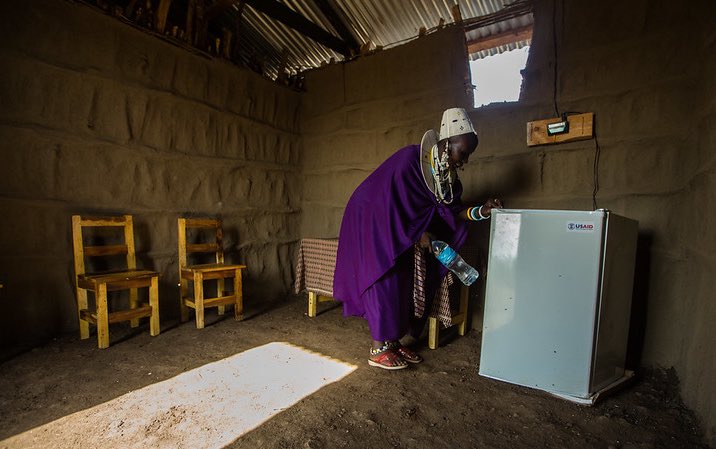Third in a series of posts on briefs by the Think20 (T20) task force on Sustainable Energy, Food, and Water Systems. T20 is a G20 engagement group that connects and collaborates with think tanks around the world to provide ideas and recommendations. The task force is one of 10 advising this year’s Saudi Arabia G20 Presidency, which just culminated in the Nov. 21-22 summit. Read the other posts here and here.
Signals that the world is moving toward a clean energy future are everywhere. The market for green bonds, focusing on products offering environmental and social benefits, has recently passed the $1 trillion mark; and the Rockefeller Foundation just committed $1 billion for a green recovery from the pandemic with a focus, among others, on distributed renewable energy technologies.
But the gaps are still enormous, particularly for Africa south of the Sahara and its agriculture sector. Agriculture accounts for 52% of the region’s employment, yet for just 2% of total electricity consumption. Expanding access to clean energy can help Africa stave off worsening food security by accelerating sustainable agricultural development; improve water security; and accelerate rural and overall economic growth, including labor absorption.
Unfortunately, the COVID-19 pandemic has, for the moment, reversed African progress on clean energy development. In 2019, 580 million people in the region lacked access to electricity, three-quarters of the global total, according to the International Energy Agency (IEA); in 2020 that number is expected to rise for the first time in years.
The T20 task force on Sustainable Energy, Food, and Water Systems makes five recommendations to redress the slowdown of investments and accelerate clean energy access in Africa:
- Support the development and accessibility of data on accessible water resources and optimal rural energy system sizing. Much of the data on profitable energy and water access is either behind publishers’ paywalls or otherwise not accessible, and linkages between data on water, energy and agricultural development are not being made. The African Union, including its Ministers’ Council on Water (AMCOW) has started to develop such connections, and other agencies, like the African Development Bank and the U.K. Foreign, Commonwealth & Development Office (FCDO), are supporting capacity building on energy modeling tools that can then be linked with water and agricultural investments, to ensure that economic growth, environmental sustainability, and equity goals of national governments can be met.
- Support the enabling environment and develop capacity and incentives for localized renewable energy systems. In much of Africa south of the Sahara, fiscal and regulatory frameworks for energy projects are challenging, to the point where only larger companies can bear investment risks. And cross-country learnings on ways to accelerate market access and competition for renewable energy systems, facilitated by the African Union and other entities, are urgently needed.
- Promote investment in rural renewable energy systems that directly support productive use. Promising and potentially profitable areas include irrigation, cold storage, agro-processing, and transportation. Investing in these areas can unlock further investments in agriculture and water security, and improve other measures of well-being, through reducing the time used to fetch water, improved indoor air quality, and increased agricultural productivity. New investment initiatives, such as the Rockefeller Foundation’s, can accelerate the development of distributed renewable energy systems.
- Ensure that energy, water, and food policies are gender sensitive. Depending on how energy, water, and irrigation systems are designed, implemented, and managed, the burden on women might grow rather than decline. To address this, women and men need to be both consulted during the design of rural energy and water supply and irrigation systems; and they need to receive equal information and training on technologies and institutions that affect their livelihoods and the well-being of their families.
- Overcome siloed thinking and improve governance across the water, energy and food sectors. Single-sector strategies incur unnecessary costs, miss important synergies, and often lead to avoidable environmental damage. There is an appetite for increased cross-sectoral collaboration both within countries and across regions in Africa, as recent work in the Eastern Nile suggests. As an example, Power for All recently launched a collaboration platform in Uganda to create an inter-sectoral coordination mechanism.
Moreover, given substantial inequity and environmental sustainability challenges, such interventions should be accompanied by strong governance systems. For example, there are fears that solar irrigation, unencumbered by fuel costs, will lead to rapid depletion of groundwater resources in Africa—mirroring dramatic depletion levels in parts of South Asia. Social learning interventions have shown promise in improving groundwater governance in India, and are now being piloted in Africa under the Feed the Future Innovation Laboratory for Small-Scale Irrigation.
The urgency to act now
According to the latest State of Food Insecurity and Nutrition in the World Report, Africa Is the only region in the world with an increasing number of stunted children (impaired growth and cognitive development affecting health and lifelong earning ability); the number of undernourished there has grown by 32 million people since 2015 and is expected to increase more dramatically as a result of COVID-19; and more than half the region’s population cannot afford a healthy diet, because (among other reasons) a lack of access to energy for production, cooling, and transportation make animal-sourced foods and horticultural products too costly to produce.
The evidence is overwhelming and the G20, as well as private foundations, national governments and private producers of water, energy and food must not only take notice, but also act.
Claudia Ringler is Deputy Director of IFPRI’s Environment and Production Technology Division and a Flagship Co-Lead in the CGIAR Research Program on Water, Land, and Ecosystems. William Brent is the Chief Campaign Officer for Power for All. This post draws on the T20 Policy Brief, Enhanced Water Security and Energy Access: Key Investments for Sub-Saharan Africa.







